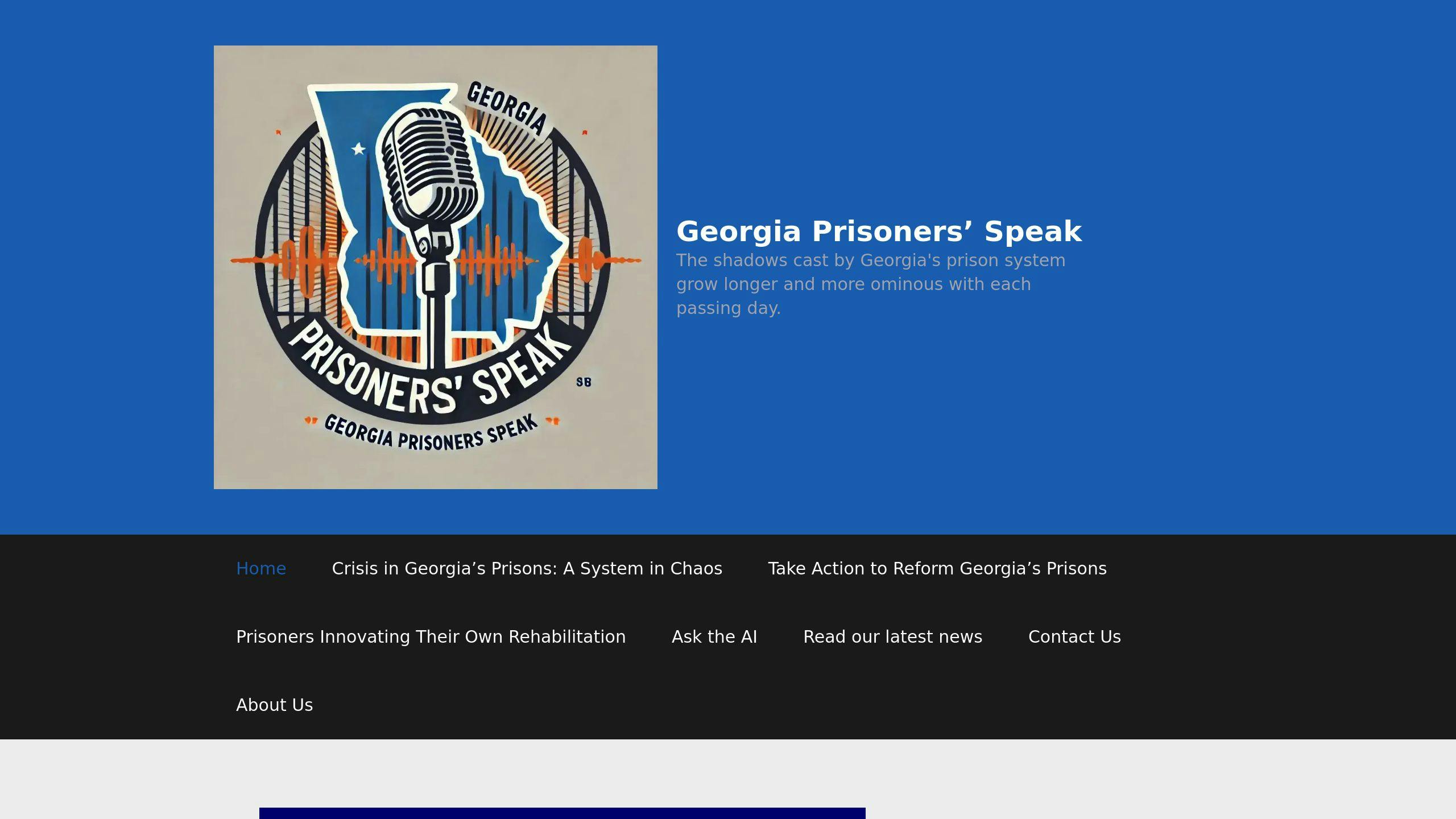Maintaining family contact during incarceration significantly lowers recidivism rates. Research shows that family visits reduce felony reconvictions by 13% and parole violations by 25%. Individuals with no visitors are six times more likely to return to prison compared to those with three or more visitors. Families provide emotional support, stable housing, and help with employment, all of which are critical for successful reintegration. Correctional facilities can improve outcomes by lowering communication costs, enhancing visitation programs, and involving families in reentry planning. Advocacy groups like Georgia Prisoners’ Speak push for these changes to break the cycle of reoffending.
How Family Contact Reduces Reoffending
Research on Family Contact and Reoffending
Studies consistently show that maintaining family contact plays a key role in reducing reoffending rates. For example, a 2006 study in the Western Criminology Review found a clear link between family connections and lower rates of felony reconvictions and parole violations [2]. Similarly, a 2004 report by the Urban Institute revealed that strong family ties not only reduce drug use after release but also boost employment rates [2].
These findings point to the vital emotional and practical roles families play in helping individuals reintegrate into society.
How Families Provide Emotional and Practical Support
Families are an essential part of the support system for individuals reentering the community. They help address critical challenges such as emotional well-being, stable housing, and finding employment. The Vera Institute highlighted this in their 2012 research:
"Research shows that incarcerated people who maintain supportive relationships with family members have better outcomes – such as stable housing and employment – when they return to the community." – Vera Institute, 2012 [2]
Here’s how families contribute:
- Emotional Support: Family connections help foster hope, motivation, and healthier coping strategies during the tough transition period [1].
- Housing and Resources: Families often provide housing and assist with accessing essential services like healthcare and education, offering much-needed stability [1][2].
- Employment Help: From job searches to transportation, families play a practical role in helping individuals gain employment by providing both support and connections [2].
The Re-Entry Policy Council’s 2005 report also emphasized that correctional programs encouraging family connections significantly lower recidivism rates and improve reentry outcomes [2]. This highlights the importance of fostering family ties during incarceration.
Ways to Keep Families Connected During Incarceration
In-Person Visitation Programs
Visiting in person is one of the most effective ways to maintain family connections during incarceration. Studies reveal that each visit plays a measurable role in lowering recidivism. For example, every additional visit during incarceration reduces the chances of re-incarceration within two years by 3.8% [3]. Even receiving just one visit per month is tied to a 0.9% decrease in the risk of returning to prison [3].
Effective visitation programs often include:
- Family-friendly spaces with clean, comfortable seating areas.
- Extended visiting hours to accommodate working families.
- Staff support to encourage positive interactions during visits.
But when in-person visits aren’t possible, other ways to stay connected become just as important.
Other Ways Families Can Stay in Touch
For families unable to visit due to distance, health concerns, or financial barriers, alternative communication options are available. Here’s a quick comparison of these methods:
| Communication Method | Benefits | Considerations |
|---|---|---|
| Video Calls | Provides face-to-face interaction without travel | Requires technology access and scheduling |
| Phone Calls | Quick and widely accessible | Costs per minute and time limits can be restrictive |
| Letters/Email | Affordable and allows detailed messages | Delays due to processing and screening |
Some facilities also use tablets to expand communication options when visits aren’t possible. However, these tools should be seen as an addition, not a replacement, for in-person visits.
On top of this, research shows that each unique visitor to an incarcerated person reduces their risk of reoffending by 3% [3]. By maintaining consistent and meaningful contact, these methods help lower the chances of re-incarceration and support smoother reintegration into society.
How Policies and Advocacy Can Support Family Contact
Policy Changes to Support Family Contact
Correctional facilities can adopt policies that strengthen family connections. Here are some areas that have been shown to make a difference:
- Lowering Costs for Communication: High fees for phone calls and video visits often discourage families from staying in touch. Offering subsidies or reducing these costs can lead to more frequent communication and stronger bonds.
- Improving Visitation Opportunities: Extending visiting hours and ensuring a welcoming environment for visits can significantly impact reoffending rates. Facilities that invest in better visitation programs often see improved outcomes for both individuals and their families.
- Involving Families in Reentry Planning: Including families in parole hearings, offering resources for reentry, and maintaining open communication between facilities and families can help build the support networks needed for successful reintegration.
Advocacy groups, such as Georgia Prisoners’ Speak, play an important role in driving these changes forward.
How Georgia Prisoners’ Speak Pushes for Change

Georgia Prisoners’ Speak (GPS) focuses on improving family contact policies through advocacy and reform. They work to identify and address obstacles that prevent meaningful family connections.
Their efforts include legal action, public education campaigns, and pushing for policy changes. GPS highlights issues like constitutional visitation rights, the effects of family separation, and the need for family-oriented reforms. They also advocate for greater transparency in how correctional facilities handle family contact.
The American Correctional Association emphasizes the importance of family relationships in reducing crime [2]. By tackling these barriers, GPS helps disrupt the cycle of recidivism and promotes stronger family ties.
sbb-itb-7858f51
Prison: how to break the cycle of reoffending?
Conclusion: Family Contact as a Key to Reducing Reoffending
Maintaining family ties during incarceration plays a major role in lowering recidivism rates, as shown by data on felony reconvictions and parole violations. These relationships offer both emotional support and practical help, making reintegration smoother.
"Family can be a critical component in assisting individuals transitioning from incarceration because family members provide both social control and social support, which inhibit criminal activity." – American Correctional Association, Corrections Today [2]
Family support not only stabilizes emotions but also helps with essentials like housing, employment, and tackling reentry challenges. Research has consistently shown that regular family visits reduce the likelihood of reoffending [3].
To make the most of these benefits, correctional facilities should focus on improving family contact by:
- Affordable communication options to ensure families can stay in touch
- Better visitation programs that create a positive, welcoming atmosphere
- Involving families in reentry planning and parole discussions
Advocacy and policy reform are essential to removing obstacles to family contact. Groups like Georgia Prisoners’ Speak are key players in pushing for these changes and emphasizing the link between family support and reduced recidivism.
FAQs
Does visitation in prison reduce recidivism?
Yes, prison visitation has been shown to lower recidivism rates. Studies report a 13% reduction in felony reconvictions and a 25% drop in parole violations. Each additional visit reduces the two-year reincarceration risk by 3.8%, while monthly visits cut it by 0.9%. Having more unique visitors also helps, decreasing re-conviction risk by 3% [2][3].
"Supportive family relationships can promote psychological and physiological health for incarcerated people and their loved ones." – The R Street Institute [3]
Maintaining regular contact with family – whether through visits, calls, or letters – plays a key role in helping individuals reintegrate successfully and reduce their chances of reoffending. This highlights the need for policies that encourage family involvement during incarceration.
How does family support reduce reoffending?
Family support provides crucial resources and encouragement that help individuals rebuild their lives. Here’s how different types of support make a difference:
| Support Type | Impact on Recidivism |
|---|---|
| Emotional Support | Creates a sense of stability and belonging |
| Social Control | Promotes accountability and positive choices |
| Practical Assistance | Helps with housing, employment, and reentry needs |
| Mental Health | Improves emotional well-being and motivation |
These elements work together to create a stronger foundation for reintegration, reducing the likelihood of reoffending.
Related posts
- 10 Prison Reform Success Stories from Across America
- Study: Financial Impact of Incarceration on Families
- Georgia prisons are doing virtually nothing to rehabilitation, but prisoners themselves Have been learning computer science using cell phones and tablets.
- Impact of Family Advocacy on Prison Reform

